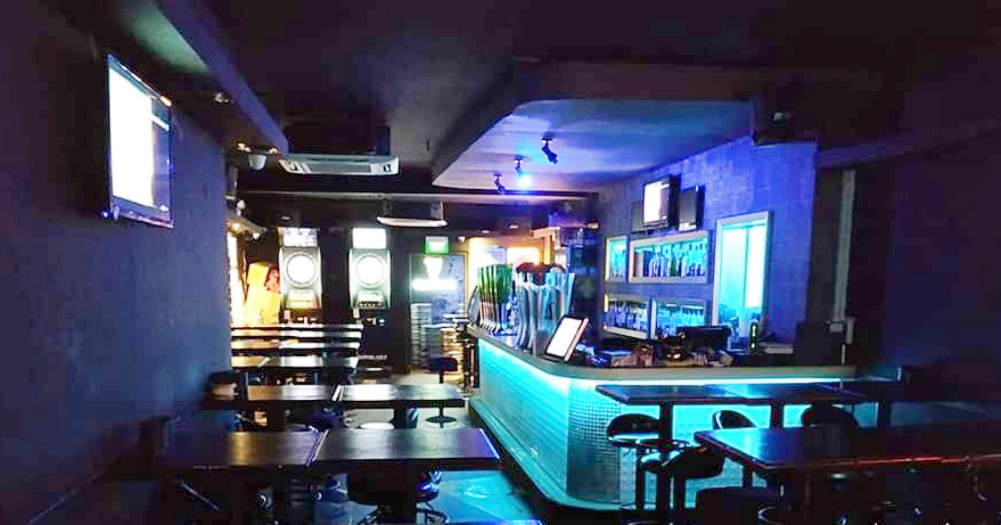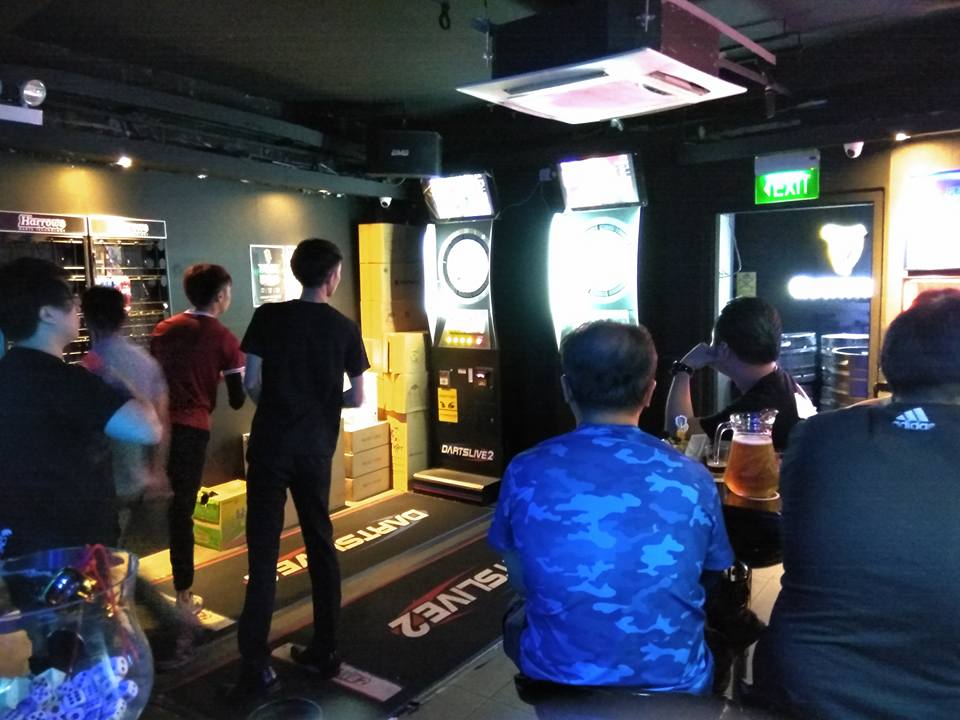Closed for over 3 months & no rental rebate from landlord yet: South Bridge Rd pub owner on Covid-19 woes
Closed for over 3 months & no rental rebate from landlord yet: South Bridge Rd pub owner on Covid-19 woes
Stories of Us: A pub owner shares why it's hard for entertainment outlets to adapt to a post-Covid-19 world, and the challenges that they face now that they cannot open for business.

Occupying one of the refurbished shophouses along South Bridge Road is Toxic Room.
The 3-year-old KTV and pub is one of many entertainment outlets that dot the riverside locale, a popular watering hole for many office workers looking to wind down after work.
People visit Toxic Room for three things: "Drinking, singing, darts," laughs owner Jeremy Khiang over a video call with Mothership.
Fans of Toxic Room come for its cozy, laid-back, and unpretentious atmosphere. Scrolling its Facebook page, one of the pub's slogans, "Save water, drink soju" made me chuckle.
Khiang also owns another KTV pub at Tai Seng called Lucid Bar, which has been operational for about a year or so.
The former tutor opened Toxic Room because he loves singing and darts. Business boomed. On a good weekend, Toxic Room would be filled with up to 70 patrons. Toxic Room's success led him to open Lucid Bar two years later.
 Patrons at Toxic Room playing darts. Via Toxic Room/Facebook.
Patrons at Toxic Room playing darts. Via Toxic Room/Facebook.
Even at the start of this year, Khiang enjoyed brisk business. In fact, in the two months before the circuit breaker, Khiang's pubs were bringing in 5-digit profits.
Surprisingly, he says, despite the pandemic outbreak at the start of 2020, business was still good up until the start of the circuit breaker in early April.
"I think because people didn't want to go to the big pubs, the discos and all the you know, where there's a big dance floor," he muses. It makes sense. After all, the bigger outlets present more warm bodies to catch a virus from.
Business at Toxic Room and Lucid Bar only came to grinding halt when the government implemented the nationwide lockdown circuit breaker.
Local businesses, especially entertainment outlets like bars, pubs, and even cinema theatres, were shuttered in a bid to stem the spread of Covid-19 infections and prevent clusters from festering.
Landlords act blur or refuse rental rebates
The move was abrupt and while every public-facing business owner would be affected, Khiang understands completely the reason for it.
In fact, he appreciates the slew of measures — like the Rental Relief Framework which gives SMEs like Khiang's up to four months of rental relief — that the government has mandated to help businesses in Singapore.
For qualifying commercial SMEs, the government will provide up to two months of rental relief — given to the landlords to be passed down to tenants — while the landlord is required to provide another two months'.
Unfortunately, Khiang sees a particular "disconnect", in that the rebates do not go past the landlord.
On the landlords that he has encountered, Khiang had this to say:
"A lot of landlords, they know about it, but they either act blur or they will just tell you that they're not going to rebate it."
Landlord issues
Khiang's landlord, in particular, hemmed and hawed.
At first he asked Khiang to pay one third of the rental. When Khiang replied that the government had already announced the property tax rebate, the landlord said that the rebate wouldn't be received so quickly.
Both agreed then to wait. While the landlord has agreed to a moratorium on the rent for the time being, he is allegedly dragging his feet on passing on the rental rebates even though it has been mandated by law.
It's not a fair arrangement for Khiang who lets on that he has never missed his rental payment over the last three years. He also doesn't bother his landlord for the small issues, like little repair works, in the pub.
Most tenants, says Khiang, have the fear that landlords will increase their rental. And so they pay their rental on time and avoid disturbing their landlords in hopes that the latter won't increase their rent the next time it's up for renewal.
Which is why the response from his landlord has been quite "shocking", according to Khiang.
"I feel like as Singaporeans we should help each other get through this crisis right?"
Waiving the rental, he says, would make it so much easier for tenants to get back into operations once they're able to. Sadly, he says, not many landlords think this way.
Help from business partners
Speaking of helping one another, Khiang is particularly grateful for several of his business partners.
Asia Pacific Breweries, which supplies Tiger Beer every week, offered to take back and refund the unopened beer when the circuit breaker was announced, saving Khiang up to S$2,000.
Star Box, which leases the KTV system, waived the rental for the duration of circuit breaker, saving Khiang up to S$600.
Dartslive, which leases dart machines, waived the rental for seven machines used across Khiang's two pubs, saving him over $2000 per month.
Lastly, Singtel agreed to waive his internet service contract for three months after he called in.
These acts of kindness stand in contrast to his issues with his landlord, says Khiang.
He has, of course, the option to file for relief with the Ministry of Law, where a panel of assessors will decide if the landlord is able to and should pass on the rebates now.
However, Khiang also has to consider the delicate issue of rental contract renewal with his landlord when the lease is up next April.
There's always the fear, he says, of an increase in the rental and if that is so, he would have no choice but to move and incur more costs.
No income to support his part-timers
Khiang's woes are compounded by the fact that he simply cannot support his part-time staff. There's just no income for that.
Both of his pubs are run by one full-time staff each — Khiang and a manager.
Another three to four part-time staff work the bartending and service duties at each pub. These part-timers are drawn from a pool of about 20 Singaporeans.
While this lean operation helps Khiang stay agile in a cutthroat industry — useful especially during a situation like this — it also means that he has a lot of staff that are not covered by relief like the Job Support Scheme which is able to help pay for his full-time staff.
"For the part-timers, I told them that they have to go apply for relief and stuff, I can't really help them. But we told them that once we are allowed to operate right, we would definitely employ them back."
 Khiang and his staffers. Image via Toxic Room/Facebook.
Khiang and his staffers. Image via Toxic Room/Facebook.No new normal for pubs
Khiang is ready and raring to go once entertainment outlets are allowed to open again. However, there is a nagging uncertainty about what his business will look like when it does.
"If you are selling things, you can just change your whole business model to a online business model. You can do live streaming, you can do online auction, you can have a website. It's easy, but not all businesses as as easy."
The same cannot be said for entertainment outlets which depend a lot on patrons being physically present. The drinks, the music, and most importantly, the atmosphere don't translate well online.
And if we were to look at other businesses that have opened, with their safe-distancing and group quota of five persons, it's hard to visualise this arrangement working in a pub, if they're allowed to re-open.
Some say that a crisis like this pushes one to innovate and come up with better, creative solutions. Indeed Khiang and his partners have been struggling to think of ways to innovate their products.
For instance, playing dice — a common pub game.
"So the only thing we could think of is this: You download a dice program and you play dice on your handphone —"
I stifle a laugh.
"You see, you're laughing right? You got to admit, there are certain limitations!"
Future up in the air
It's a bit of a downer, but Khiang thinks that there is little to no way that pubs like his can innovate.
"There's no new normal. It's either we continue or we decide to stop. I don't think we can innovate."
Indeed, the future of his pub doesn't look that good. As long the virus is still a threat, there will be limitations on the way that he can run it, which would affect his revenue.
Perhaps the government can continue doling out measures like the JSS to cover businesses' payrolls to help them tide through the post Covid-19 period just for a while, he muses.
After our call, Khiang sends over a WhatsApp text asking if we could mention in the article that Toxic Room is hoping to see all its regular customers once it is able to open again ("haha").
His breezy tone belies the fact that there is much working against entertainment outlets like Toxic Room; they require a lot of help and a healthy dose of good luck to survive in a post-Covid-19 world.
So if you and your friends are looking for a pub once entertainment outlets are open for business again, perhaps you might want to give Toxic Room a try.
Stories of Us is a series about ordinary people in Singapore and the unique ways they’re living their lives. Be it breaking away from conventions, pursuing an atypical passion, or the struggles they are facing, these stories remind us both of our individual uniqueness and our collective humanity.
Top image via Jeremy Khiang.
Comments